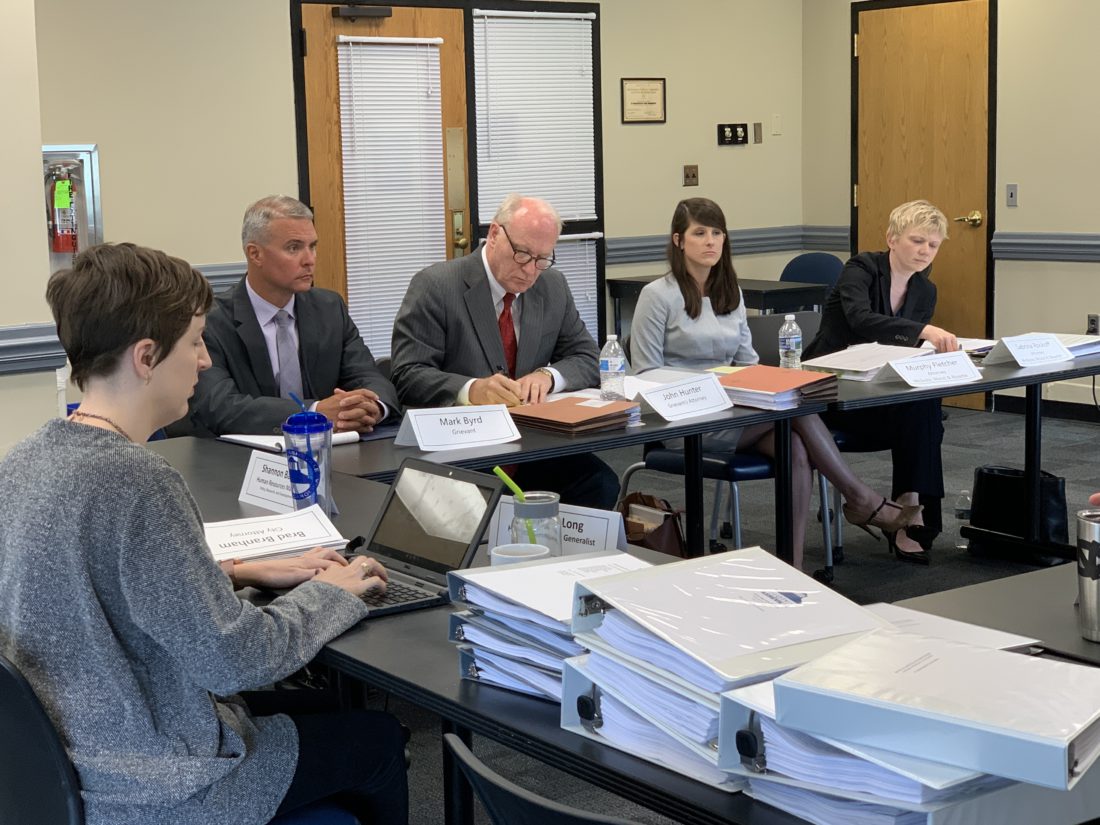It took more than 10 hours of testimony and deliberation, spread among three meetings over the course of 12 days, for Asheville’s Civil Service Board to reach a decision on the July 2018 firing of Asheville Police Department Capt. Mark Byrd by former Chief Tammy Hooper. And even following that lengthy process, the board was split: Chair Carol Goins voted against her colleagues in a 4-1 decision finding that Hooper’s action was not justified and ordering the city to reach “a just conclusion of the matter.”
How the board reached its decision, however, remains unclear. For the first time in at least three years, the CSB moved to close its discussions to the public at the city’s request, with board attorney John Henning citing the need to protect confidential personnel information and preserve attorney-client privilege.
Attorney Sabrina Rockoff, representing the city, admitted that the request was “a little unusual” but said it was necessary given the unique circumstances of Byrd’s case. Before the board entered closed session on July 17, she said that the issues leading to his termination involved several other current and former Asheville employees, whose privacy would be violated in an open hearing.
Representing Byrd, attorney John Hunter responded that the board’s usual policy was to hold open hearings and that his client was comfortable with continuing openly. He suggested that the city’s request to close the proceedings would set a dangerous precedent for future cases.
“I think this is overreach by the city,” Hunter told the board members. “If you grant their request, you’d have a case where the city could effectively close every hearing you have by listing as evidence third-party confidential information, whether it’s used or not. … They’re asking you to presumptively close a hearing before the very first word is said.”
Notably, Rockoff mentioned issues other than personnel information protected by state statute in her argument to close the hearing. “The city has additional concerns beyond 160A-168 [the North Carolina law concerning the privacy of public employee personnel records]. To me, this is tantamount and should be frankly enough to close this hearing,” she said.
The CSB entered a separate closed session before any formal testimony on Byrd was presented “for the purposes of hearing the city’s other reasons,” according to Goins. However, the motion to enter that closed session only cited 160A-168 personnel information; the state law governing closed sessions does not list hearing unspecified arguments from a municipal representative as a valid reason to avoid an open meeting.
Moreover, Rockoff estimated in open session that it would take her “five minutes” to present the city’s concerns to the CSB. She did not leave the closed session called to present those reasons for close to an hour. The board members then continued the closed session with their attorney as the only other person in attendance; the preservation of attorney-client privilege was not listed in the board’s motion as a reason for the closed session.
In its decision on Byrd’s firing, the CSB said the city’s allegations of Byrd’s untruthfulness “were not substantiated” and that his violation of other policies “did not rise to the level of misconduct justifying termination.” Hooper had claimed in a termination letter dated July 13, 2018, that the captain had disobeyed APD ethics policies and shown unsatisfactory job performance.
Hooper’s letter also criticized Byrd for “accusing me of engaging in an inappropriate relationship with another officer, an allegation which you know has been investigated and found untrue.”
Former APD Sgt. Lisa Taube filed a suit in December alleging that Hooper and an unnamed female lieutenant, with whom the chief had engaged in personal travel, had pressured Taube and her wife to have drinks and “‘hang out’ together” at a downtown bar.
Taube’s suit says that she shared her concerns with Byrd, as well as former APD Capt. Stony Gonce, and that the three spoke with Asheville’s Human Resources Department in late 2017. Hooper fired Gonce on May 1, 2018, citing his violation of workplace harassment and inappropriate personal conduct policies in her termination letter. Taube resigned from the force on Aug. 31; Hooper resigned from the force on Jan. 2, receiving a $118,000 lump-sum payment for up to 75 hours of consulting services and accepting a resignation agreement that prevents her from making legal claims against the city.
As of press time, CSB attorney Henning had not acknowledged multiple Xpress requests for the board’s closed session meeting minutes. Asheville spokesperson Polly McDaniel did not respond to a request for comment regarding the city’s specific plans for restitution to Byrd, whether officials plan to challenge the CSB’s decision and if Gonce is challenging his own termination.
Additional reporting by Virginia Daffron






Very interesting and informative “behind the scenes reporting” by Mr. Walton and Ms. Daffron.
Really enjoy reading these well researched and written commentaries on local government by your very capable staff.
It is such a pleasure to peruse an article with a potential for political or other biases without finding any hint of it, and know
that you won’t be disappointed in the journalistic endeavor by the rampant distortions and partisanship found in so much
of today’s Main Stream Media.